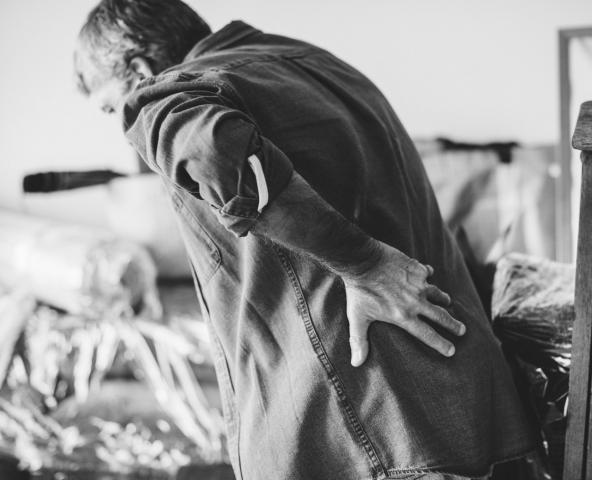If Your Back Hurts, You Might Need a Sports Podiatrist or a Better Office Chair Says Leading Sydney CBD and North Shore Sports Podiatrist Mark Lin of Footwork Podiatry.
If Your Back Hurts, You Might Need a Podiatrist, Orthotics – or a Better Office Chair Says Leading Sydney CBD and North Shore Sports Podiatrist Mark Lin of Footwork Podiatry.

If Your Back Hurts, You Might Need a Podiatrist, Orthotics - or a Better Office Chair
Lower back pain could just be something we have to experience because of our evolutionary history says Mark Lin and Wei Lee of Footwork Podiatry, but these days, it’s just as likely to come from the new demands we’re placing on our bodies.
“There are a lot of things that can cause low back pain,” Lin says, “But a lot of people don’t realise it could come from their feet.”
The logic is straightforward, says Mark. Because we, unlike any other animal on the planet, walk around on our hind legs. As a result, our legs and feet take a lot of strain. Although we’ve evolved to be upright, there are still a few variations in the gene pool that, while they don’t get us down in the literal sense, certainly do so in the figurative one.
It’s an obvious chain reaction. Muscles, joints, and ligaments strain when the feet don’t carry their load correctly, and since our backs also take up the lot of the physical strain inherent in our upright posture, the chain reaction is easy to follow.
Foot problems can cause pain in the ankles, shins, knees, hips and lower back - and some people experience the full chain of pain from the feet upward.
Orthotics could be a way to correct lower back problems caused by foot issues, but Wei says they're not a solution they prefer for their patients. They support the foot and strive to correct the way that the feet carry their load. But not all of them are created equal, and they only help you when you're wearing them- there's no long-term correction.
A look through research on the topic of orthotics doesn’t show anything very conclusive, but it’s interesting to note that some widely-cited trialslooked at “off-the-peg” arch supports rather than custom orthotics. Other studies show more positive results, but note that patients were told about the theory behind their custom orthotics and speculate that this may have heightened the placebo effect.
“We do occasionally use orthotics, and they help some people" says Mark, but we prefer to use them as adjunct to therapies that correct the real problem that causes pain. If we can achieve a solution without making our patients depend on orthotics, we will."
Getting to the root of the matter is the best solution for those with low back pain, says Lin. His mission isn’t just treating pain - it’s also about preventing its return.
“There are a lot of possible causes to examine and eliminate,” say Lin. “It could be your office chair - or it could be the way you walk.”
He suggests that we begin with the physical activities we perform most. “If you spend most of your day seated, your posture or your desk and chair are likely to blame,” says Mark. “If you spend most of your day standing or walking, your feet, your shoes, and your posture are among the most likely culprits.
If you’re still not sure, Wei suggests starting from the feet and working your way up. “Our assessment will help you to make progress towards finding the cause of your lower back pain,” he says. “And if it lies in your feet, or if the way you use your lower limbs are contributing to it, then we have the solutions to the problem too.”
Mark Lin and Wei Lee are leading Sports Podiatrists in Sydney. Footwork Podiatry has two convenient locations Roseville on Sydney’s North Shore and Sydney CBD.Both offer the full spectrum of podiatry treatments and although they receive referrals from medical doctors, they are willing to assess and assist anyone who suffers from lower-limb issues.
For further information, visit the Sports and Podiatrist Clinicto book online, or call Mark Lin or Wei Lee and their friendly team on +61 2 9416 7889.
The information contained in this guide is provided in good faith and is not intended to be nor is it to be used as a substitute for any sort of professional, medical or podiatric advice. An accurate diagnosis can only be made following a personal consultation with a podiatrist. Any users should always seek the advice of their podiatrist, or other qualified healthcare providers before commencing any treatment.
Syndicated by Baxton Media.

